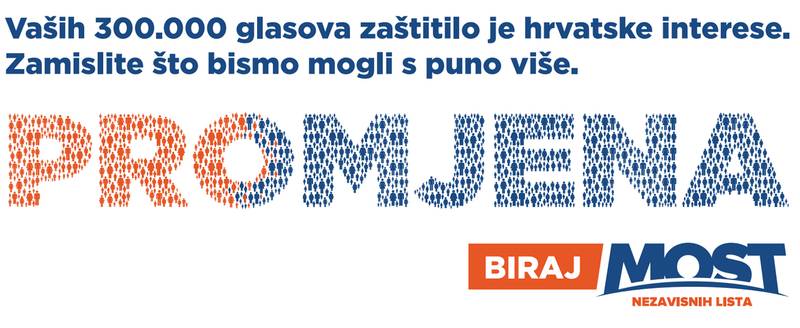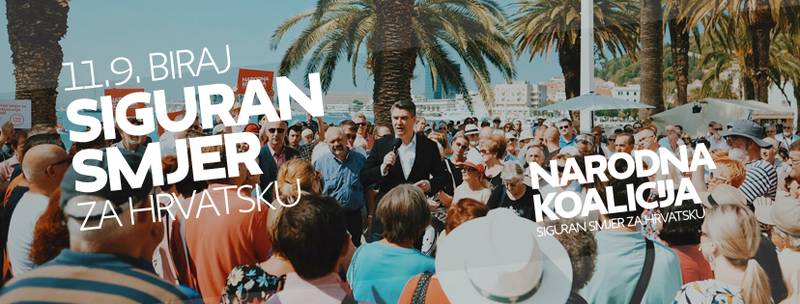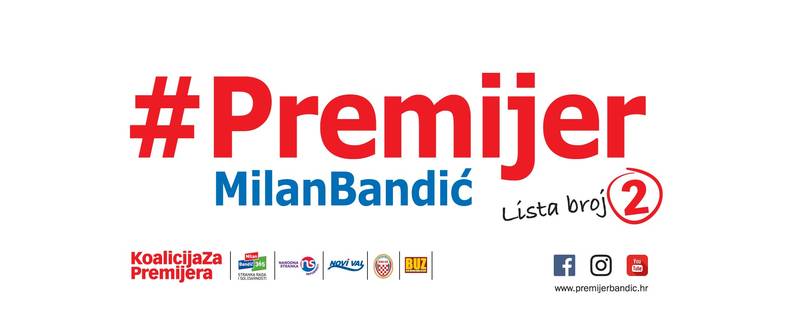Spanish or Irish Scenario for Croatia
Adelina Marini, September 11, 2016
 On September 11th, Croats are once again coming out to vote after last year’s elections produced a strange coalition between a party, turned to the past, and a newly-hatched formation with great ambition for reforms, but with zero experience. Up until a week ago, or even a bit longer, it seemed like the situation from November of last year could be repeated – the two large parties will finish with equal results and will need an accommodating partner for the formation of a coalition. Polls showed that there will be almost the same result as last year, which made many in Croatia forecast a Spanish scenario for the country – a prolonged period of time with no government and elections in a few months.
On September 11th, Croats are once again coming out to vote after last year’s elections produced a strange coalition between a party, turned to the past, and a newly-hatched formation with great ambition for reforms, but with zero experience. Up until a week ago, or even a bit longer, it seemed like the situation from November of last year could be repeated – the two large parties will finish with equal results and will need an accommodating partner for the formation of a coalition. Polls showed that there will be almost the same result as last year, which made many in Croatia forecast a Spanish scenario for the country – a prolonged period of time with no government and elections in a few months.
What about an Irish scenario?
Ireland also produced a draw, but managed to form a government much quicker than Spain. There was a lot of discussion in the country about the formation of a broad coalition between the two largest parties – Fina Gael and Fianna Fail - which did happen, but halfway. Two months after the elections, the two parties signed an agreement that Fina Gael will form a minority government, once again headed by Enda Kenny. Several thousand kilometres to the south-east the subject of a broad coalition was raised a year earlier by the new star on the political horizon – Most of independent lists, who initially demanded that a wide coalition be formed with the two largest parties – the Social Democrats of Zoran Milanović and the Croatian Democratic Union (HDZ) of its leader at the time Tomislav Karamarko. Both the SDP and the HDZ refused.
In 2016, the subject is brought up once more, but not by Most. There has been talk about it in media for months, but the two parties adamantly denied such possibility. After HDZ’s bitter experience with Most, the situation might not look as impossible as a year ago. In the beginning of 2016, Most sold dearly their 19 seats in parliament and turned out to be unexpendable to the very end of the government of Tihomir Orešković. This year polls show that they will have less seats, but again will be an unavoidable factor, which drives their price high once more – they put to the table the demand that before a government is formed, parliament must vote several laws, which, to them, are of extreme importance, and only then will they sit at the negotiation table.
As opposed to last year, SDP and HDZ are no longer as aggressive towards Most and are making cautious statements. A Spanish scenario is guaranteed if none of the large parties manages to make a coalition agreement with Most. Before reaching the Irish option, however, a new possibility came up last week with a very fitting name – the Only option. This is a pre-election coalition of new and not so new parties, at the base of which is Live Wall, led by the young Ivan Vilibor Sinčić. At the campaign start, polls showed that the Only option will be at the brink of the election threshold, but because of the failure of SDP and HDZ in proposing something that people really need, Live Wall has almost caught up with Most and it is quite possible it will turn into a key factor in government formation.

This will probably drive the price of Most down, but will also spawn instability of a different character, for Live Wall is a Eurosceptic and anti-establishment party, which, at the previous elections, advocated for Croatia leaving the EU and NATO, for a considerable banking reform, which would deprive the national bank of its independence.
Which is the best option for the EU?
Keeping in mind that it is a make-or-break time for the EU and already in many countries there are anti-establishment and anti-European parties either in power, or already quite powerful, it is of great importance to the EU who will come to power in Croatia, which is situated in a still volatile region. After the HDZ was taken over by its MEPs, the party returned to the founding values of the European People’s Party (EPP) and you can deduct from the statements of its leader Andrej Plenković that if he becomes Prime Minister he would keep Croatia as close to the EU as possible. He plans to rely on key European policies and stated that Croatia needs to follow European rules and be an accommodating and disciplined member.
Former PM Zoran Milanović, who leads the left-liberal-right-wing pre-election People’s coalition has proved to be an even bigger Eurosceptic than he was during his 4-year rule, during which Croatia joined the EU (after a referendum). During this year’s election campaign, though, he went for a sharper tone of voice, in order to set himself apart from Andrej Plenković, who was the subject of too many parallels by media and analysts. During the last debate between the two of them for the Croatian Nova television on Friday evening, Zoran Milanović once more stated that should he become PM, he will implement the measures that are good for Croatia, not the ones Brussels says are good.
He reminded that quite often Brussels gives recipes that turn out to be harmful. “If you listen to Brussels, you will end up like Greece”, he further said, stating that he knows how to deal with Brussels. During this debate the two of them positioned themselves as the man from Brussels, who has lived away from Croatia and knows nothing about governing (Andrej Plenković) and the experienced Prime Minister, who has, however, absolutely no clue as to how the EU functions (Zoran Milanović). Despite that, it is difficult to say that Croats are facing a choice – a pro-European or anti-European government. With this rhetoric it is obvious that Zoran  Milanović is trying to discredit Andrej Plenković as a man of Brussels and at the same time moving closer to Live Wall in case he needs to make a coalition with them.
Milanović is trying to discredit Andrej Plenković as a man of Brussels and at the same time moving closer to Live Wall in case he needs to make a coalition with them.
Most of independent lists and its leader Božo Petrov have so far not talked on European subjects, but you can judge by their behaviour that they are pro-European oriented, which means that a possible ruling coalition between them and the HDZ would be very good news for the EU.
Which were the main subjects of the campaign?
An attempt was made for parties to push away from the battle between Ustaša and Partisans, which people are totally fed up with, but the subject was not fully avoided, although it was marginalised. Candidates attempted to lure voters with generous promises for new jobs, more allowances for newly born children, raising pensions and wages. There is an ideological chasm yawning between the People’s coalition and the HDZ regarding taxation policy. The HDZ propose to lower VAT to 23% by the end of their term (from the current 25%), but Zoran Milanović believes this would not result in a tangible rise of the people’s disposable income. He proposes that raising non-taxable income continues. Major arguments sparked around the health reform, education and culture. You can read further details about the programmes of the two largest parties here.
The campaign in general was quite lifeless and there were few debates. Leaders' debates were two and just between the leaders of the HDZ and SDP, with the second debate totally repeating the first one thus turned out to be unnecessary. Anyway, the campaign did not go without scandals. One of the largest ones, which also had international response, was a statement by Zoran Milanović in front of army veterans, which was secretly taped and leaked to media. In it, Milanović called the Serbian people “a bunch of weaklings”, who have the ambition to rule the entire Balkans, pronounced Bosnia and Herzegovina a non-state, and declared there is no one there to talk to. In general, Serbia got positioned as possibly the most important subject of the election campaign, both regarding its European road and the obstacles Croatia placed in front of it and regarding the membership of the Serbian Progressive Party (SNS) of PM Aleksandar Vučić in the EPP. Milanović’s quick tongue got him in a personal argument with Andrej Plenković.
Another large scandal was caused by the interview of Zagreb mayor Milan Bandić, who once again decided to enter national politics after spending almost five terms as mayor of the Croatian capital. His campaign stood out the most, especially in the beginning. The entire country woke up covered in posters, which had one word only #PrimeMinister. Milan Bandić led a coalition, the purpose of which is him becoming a Prime Minister. This is also the name of the coalition – “Coalition for Prime Minister”. The generous spending in his campaign raised a number of questions about where the money came from. This was also a part of the scandal in his interview for the RTL television with journalist Mirjana Hrga. In it, he admitted that the city of Zagreb is financing his campaign, after which he started attacking the journalist.

He picked on her and explained to her that regardless of what she asks him, he will say what he wants. His behaviour reminded the most bitter authoritarianism examples. The interview was widely discussed by Croatian media, but remained with no consequences for the Zagreb mayor, who got arrested several times by the specialised prosecution for battle against corruption, including earlier this year, but no proof of corruption or misuse of public funds was ever found. During his interview for RTL he stated that the moment will come when he will talk about this period of his life (after spending several months in prison).
He could not explain what is currently stopping him from talking about it. The interview must have left a very bad taste to anyone with proper manners and liberal views, and should enter democracy textbooks as an example of how it should not be done. At one point in the campaign polls set Mr Bandić at third spot in the list of probable PMs. Latest polls show that the coalition, led by him, could win considerably more parliament seats than expected.
The campaign ended at midnight on Friday. Croats had a day for thought on Saturday. The first polls are expected at 9 pm (CET) on Sunday. At that time it will become clear what the true attitudes of Croats are. It is quite possible that voting activity will suffer from this repetition of the elections, after quite a few of those viewing Most as the alternative are already disappointed with them.
Translated by Stanimir Stoev
 Kolinda Grabar-Kitarovic | © KGK
Kolinda Grabar-Kitarovic | © KGK Jozo Rados | © European Parliament
Jozo Rados | © European Parliament Aleksandar Vucic, Andrej Plenkovic | © Vlada RH
Aleksandar Vucic, Andrej Plenkovic | © Vlada RH